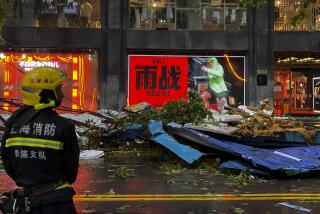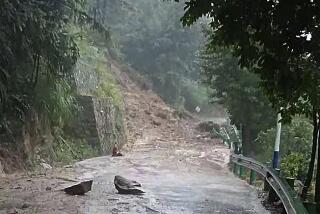China flooding gives government another credibility crisis
BEIJING — Deadly rain that battered the nation’s capital over the weekend has left the Chinese government knee-deep in its latest credibility crisis. Authorities are accused of underreporting the number of dead while failing to provide adequate infrastructure to safeguard against flooding in a swiftly modernizing metropolis.
The official death count in Saturday’s downpour, described as the heaviest in more than 60 years, was 37 people. The deluge paralyzed Beijing’s outdated drainage system, flooding wide swaths of the city, toppling homes, downing power lines and trapping an unknown number of motorists in submerged vehicles.
Fangshan, a rural district on the southwestern edge of Beijing, was inundated by a torrent of muddy floodwater, raising suspicion that hundreds of dead may still be unaccounted for. A stretch of the G4 expressway leading through the area was under several feet of brown water and dozens of vehicles were submerged.
“Who cares about us?” Wang Jianxue told a Hong Kong broadcaster Monday while searching for his brother in a flooded Fangshan ditch. “I called police. No one cared. The next morning I came here myself looking for my brother.”
When his corpse emerged, police rushed to the scene, stripped to their underwear in front of a crowd of reporters and waded into the water as Wang wailed in anguish.
The collective frustration of millions of Chinese is being shared on the country’s frenetic Twitter-like microblogging platforms, outpacing the ability of censors to scrub away criticism of the government’s response to the rainstorm.
China’s leaders faced a similar situation a year ago when two high-speed trains collided in the southern city of Wenzhou, killing dozens of people. Then, as now, the public questioned the accuracy of the death toll and the competency of the rescue effort. The government also drew criticism for ignoring safety issues as the nation undergoes rapid modernization.
“This catastrophe could surpass the 2003 SARS outbreak in its test of the Beijing leadership, especially as it is now playing out in real time on [microblogs], a service which has become digital sulfuric acid to the government’s credibility,” Bill Bishop, a widely followed Beijing-based tech consultant, wrote on his blog Wednesday.
The city has defended its efforts, saying tens of thousands of rescue workers were deployed. Officials also pledged to upgrade Beijing’s sewer system and to disclose any further fatalities.
State media reported Wednesday that Beijing Mayor Guo Jinlong and Vice Mayor Ji Lin had resigned without explanation. Although some wondered whether the rainstorm response had cost them their jobs, Guo had been tapped for promotion as the city’s party secretary this month, suggesting the move was a routine reassignment.
Now, acting Mayor Wang Anshun will be responsible for defusing rising anger in the city of 20 million people.
Some residents question how urban planners behind one of the world’s most modern skylines could neglect to anticipate the threat of flooding. They accused the government of spending freely on vanity projects for the 2008 Olympics while ignoring the city’s infrastructure.
“The government always talks about urbanization, but once your city has been urbanized you still can’t handle a rainstorm?” asked Zhou Xiaozheng, a sociology professor at People’s University in Beijing. “This means we have to pay more attention to balanced development and growth. You have to consider the environment and safety.”
Further infuriating some observers is Beijing’s solicitation of donations for a disaster fund. The gesture reinforced long-held criticism that China was unwilling to share its riches with ordinary citizens.
“In just one month, China poured $43 billion into the IMF… and pledged $20 billion to Africa,” wrote a microblogger named Hailuoying. “But right after they gave out all the money for nothing, they immediately called on people for donations. You really think all Chinese people are fools?”
More heavy rain is expected this week across large portions of China; the official nationwide death toll for the storms now stands at 95.
On Wednesday, Beijing’s city government sent text messages to residents warning of an imminent storm. Some companies sent employees home early.
Some residents have begun sharing maps on the Internet aimed at identifying areas of the city prone to flooding. Online sales of a special hammer for breaking automobile glass have soared.
The Beijing Times ran a feature testing different methods for escaping from a submerged car. The conclusion: Kicking at a window or stabbing at it with headrest prongs was ineffective. Best to buy a hammer and store it in the car.
“I think Chinese people understand you can’t rely on gods or an emperor,” said Zhou, the sociologist. “You can’t trust that a savior will come. You need to rely on yourself.”
Tommy Yang of The Times’ Beijing bureau contributed to this report.
More to Read
Sign up for Essential California
The most important California stories and recommendations in your inbox every morning.
You may occasionally receive promotional content from the Los Angeles Times.











